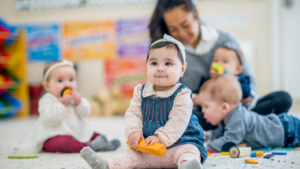As a parent, one of the most exciting milestones you look forward to is when your child says their first word for the first time. It’s a moment that signals the start of a lifelong journey of language acquisition and communication. But when can you expect to hear those first sweet words from your child? In this article, we’ll explore when kids typically say their first new words, the factors that can influence language development, and what parents can do to support their child’s language skills and avoid speech delay.
When Do Kids Say Their First Word?
On average, most children say their first word between 10 and 14 months of age. However, there is a wide range of “normal” when it comes to language development, and some children may say their first word as early as 6 months or as late as 18 months, or roughly around their first birthday. It is crucial to bear in mind that each child is distinctive, and certain factors can impact the age at which a child utters their initial word. For example, bilingual children may have a later onset of language, as they are processing two languages at once. Additionally, premature babies or children with hearing impairments may have delayed language development.
Language Milestones for Babies
Language development in babies progresses in stages, with each stage building on the previous one. Here are some language milestones to look for in your baby’s first year:
- 0-3 months: coos and makes different sounds
- 4-6 months: babbles, laughs, and imitates sounds
- 7-12 months: says “mama” and “dada,” responds to their name, and begins to understand simple commands
By 18 months, most children have a vocabulary of around 50 words and can combine two simple words to form simple phrases, such as “more milk” or “bye-bye daddy.” By 2 years of age, most children have a vocabulary of around 200-300 words and can form three-word sentences.
Factors that Influence Language Development
Although each child progresses at a unique pace, some factors can affect the development of their language skills:
- Genetics: research has shown that genetics plays a role in language development. Children with a family history of speech and language disorders may be more likely to experience delays.
- Environment: the language-rich environment a child is exposed to can have a significant impact on their language skills. Children who grow up in homes where they are spoken to frequently and read to often tend to have stronger language skills than those who are not.
- Hearing: hearing impairments can make it more difficult for children to acquire language, as they are not able to hear the sounds necessary for correct pronunciation which is vital to language development.
- Bilingualism: children who are exposed to two languages may experience a slight delay in language development, as they are processing and learning two languages at once.
- Prematurity: Premature babies may experience a delay in language development, as they may miss out on crucial periods of brain development in the womb.
What Can Parents Do to Support Language Development?
There are several ways in which parents can aid their child’s language development:
- Talk to your baby often: even before they can say their first words, babies are listening and learning from the sounds around them. They can recognize their own names even. Talk to your baby often, using real words and simple language with a warm, engaging tone.
- Engage in reading sessions with your infant: reading to your baby as a daily routine is an excellent way to expose them to language and help build familiar words to their vocabulary. Choose books with colorful pictures and simple, repetitive text.
- Sing songs and nursery rhymes: songs and nursery rhymes are great for language development, as they often use simple, repetitive language and rhyme. Singing with your child and hearing the sound of your voice will encourage him to do more.
- Respond to your baby’s babbles: when your baby babbles or makes sounds, respond to them as if they are speaking to you. This can help reinforce their attempts at communication and encourage them to keep trying and say longer sentences.
- Use gestures: pointing to objects, waving goodbye, and other gestures can help reinforce the meaning of words and aid in language acquisition. It will help them recognize familiar objects.
- Limit screen time: while some educational programming can be helpful for language development, excessive screen time can hinder language development. Make sure your child has plenty of opportunities for face-to-face interaction and playtime.
- Use the vernacular: if you are bilingual, it’s important to speak to your child in your native language, as this will help them become fluent in both languages.
- Get your child’s hearing checked: if you are concerned about your child’s language development, it’s a good idea to get their hearing checked. Hearing impairments can significantly impact language development, and early intervention is key.
Conclusion
The age at which children say their first word can vary widely, but most children say their first word between 10 and 14 months of age. However, it’s important to remember that every child is unique, and many factors can influence language development. As a parent, there are many things you can do to support your child’s language skills, including talking to them often, reading to them, and responding to their attempts at communication. With patience and support, your child will develop strong language skills and be on their way to a lifetime of successful communication.
Additional Resources
If you’re interested in learning more about language development in children, there are many resources available. Here are some helpful websites and organizations:
- American Speech-Language-Hearing Association (ASHA): ASHA is a professional organization for speech-language pathologists, audiologists, and speech, language, and hearing scientists. They provide resources and support for professionals in these fields, as well as information and education for the general public on communication disorders and their treatment.
- Centers for Disease Control and Prevention (CDC): The CDC is a national public health agency that provides information and resources on a wide range of health topics, including child development and language development. Their website includes information on developmental milestones, warning signs of developmental delays, and resources for parents and caregivers.
- National Institute on Deafness and Other Communication Disorders (NIDCD): NIDCD is a government agency that conducts and supports research on hearing, balance, taste, smell, voice, speech, and language. They also provide information and resources on communication disorders, as well as funding for research and training in these fields. Their website includes information on language development, hearing screening, and speech and language disorders.
You can also speak to your child’s pediatrician if you have concerns about their language development.
Related Keywords
In addition to the keywords already mentioned, here are some related keywords that can help you find more information on this topic:
- Early speech development
- Language skills in toddlers
- Language milestones for infants
- Baby’s first words and communication
- Infant vocalization and babbling
- Toddler vocabulary and grammar
- Speech therapy for children
- Language delay and intervention
By integrating these keywords into your search terms, you can explore a plethora of information about language development in children and discover the most effective methods to enhance your child’s language abilities.
Final Thoughts
The journey of language development in children is an exciting and rewarding one. By understanding the typical language milestones and factors that can influence language development, parents can better support their child’s communication skills. With patience, support, and plenty of opportunities for interaction and play, your child will be on their way to developing strong language skills and a lifelong love of communication.
As a mother myself, I understand how exciting it is to hear your child’s first single words. It’s a moment that you’ll remember for the rest of your life, and it marks the beginning of a new phase in your child’s development. But it’s important to remember that every baby’s life develops at its own pace, and there is a wide range of “normal” when it comes to language development in young children. Also remember, siblings develop language at their own pace, try not to compare your children as they develop their language skills uniquely.
If you have any concerns regarding your child’s language skills, do not hesitate to consult your pediatrician or a speech-language pathologist. These experts can offer guidance and assistance to enable your child to achieve their maximum potential.
Above all, remember that the most important things you can do to support your child’s language development are to provide them with a language-rich environment, full of love, interaction, and play. With your help and support, your child will be on their way to developing strong language skills and a lifelong love of communication. Support yourself by checking other resources to also help you be more knowledgeable as a mom.


